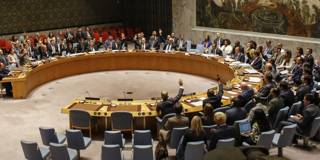It is highly doubtful whether the increasing use of economic sanctions in international politics is just, expedient, or effective. And when proponents of these punitive measures claim that commerce is possible only between civilized people, they ignore the civilizing effect of commerce itself.
LONDON – Earlier this month, US National Security Adviser Jake Sullivan accused Russia of using energy as a political weapon. In response, the Kremlin claimed that US sanctions threatened to exacerbate imbalances in the European energy market. This spat neatly highlights the increasing – and increasingly problematic – use or threat of economic sanctions in international politics.
As a tool of state pressure, economic sanctions fall short of war but are closer to it than they are to diplomacy. Yet the legal, political, and moral justifications for such measures are rarely challenged.
States have always used economics as a tool of geopolitics. The nineteenth century, when international economics was largely separated from international politics, was a brief exception to this rule: Russia even raised a loan on the London market during the Crimean War. But in the 1920s, the League of Nations formally revived the use of economic weapons against offending states. And Chapter 7 of the United Nations Charter allows the Security Council to impose economic sanctions against states threatening or breaching world peace.

LONDON – Earlier this month, US National Security Adviser Jake Sullivan accused Russia of using energy as a political weapon. In response, the Kremlin claimed that US sanctions threatened to exacerbate imbalances in the European energy market. This spat neatly highlights the increasing – and increasingly problematic – use or threat of economic sanctions in international politics.
As a tool of state pressure, economic sanctions fall short of war but are closer to it than they are to diplomacy. Yet the legal, political, and moral justifications for such measures are rarely challenged.
States have always used economics as a tool of geopolitics. The nineteenth century, when international economics was largely separated from international politics, was a brief exception to this rule: Russia even raised a loan on the London market during the Crimean War. But in the 1920s, the League of Nations formally revived the use of economic weapons against offending states. And Chapter 7 of the United Nations Charter allows the Security Council to impose economic sanctions against states threatening or breaching world peace.